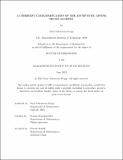A Coherent Categorification of the Asymptotic Affine Hecke Algebra
Author(s)
Propp, Oron Yehonatan
DownloadThesis PDF (1.248Mb)
Advisor
Bezrukavnikov, Roman
Terms of use
Metadata
Show full item recordAbstract
Kazhdan–Lusztig categorified the affine Hecke algebra H in terms of equivariant coherent sheaves on the Steinberg variety. Recently, Ben-Zvi–Chen–Helm–Nadler have applied the formalism of categorical traces to construct a "coherent Springer sheaf" on a moduli stack of Deligne–Langlands parameters whose endomorphism algebra recovers H. In this thesis, we extend these results to Lusztig's asymptotic affine Hecke algebra J. Using work of Bezrukavnikov–Ostrik, we construct an "asymptotic coherent Springer sheaf" on an "asymptotic" moduli stack of Deligne–Langlands parameters whose endomorphism algebra identifies with J. We show that a certain restriction of the coherent Springer sheaf identifies with this asymptotic coherent Springer sheaf and induces Lusztig’s homomorphism φ on endomorphism algebras. Next, following a conjecture of Qiu–Xi, we consider a category of equivariant coherent sheaves on the square of the G_m-fixed points in a Springer fiber. We identify its 2-categorical class with a summand of the asymptotic coherent Springer sheaf, and deduce that it categorifies the corresponding block of J. We then construct a family of functors from the mixed affine Hecke category categorifying φ. Finally, we show that the universal trace functor for the mixed affine Hecke category is right t-exact with respect to an exotic t-structure, and sends monoidal duals of connective objects to coconnective objects. To this end, we construct an explicit complex computing the 2-categorical class map for certain monoidal categories over quotient stacks. We then deduce a (co)connectivity statement for the 2-categorical classes associated to Bezrukavnikov–Riche’s braid group action for the Springer resolution. In particular, we obtain that the coherent Springer sheaf lies in cohomological degree 0 (i.e., is a sheaf rather than a complex), resolving a conjecture of Ben-Zvi–Chen–Helm–Nadler and Zhu. As a consequence of the proof, we partially resolve another conjecture of Qiu–Xi, showing that J embeds in a K-group of equivariant vector bundles on the square of a finite set.
Date issued
2023-06Department
Massachusetts Institute of Technology. Department of MathematicsPublisher
Massachusetts Institute of Technology